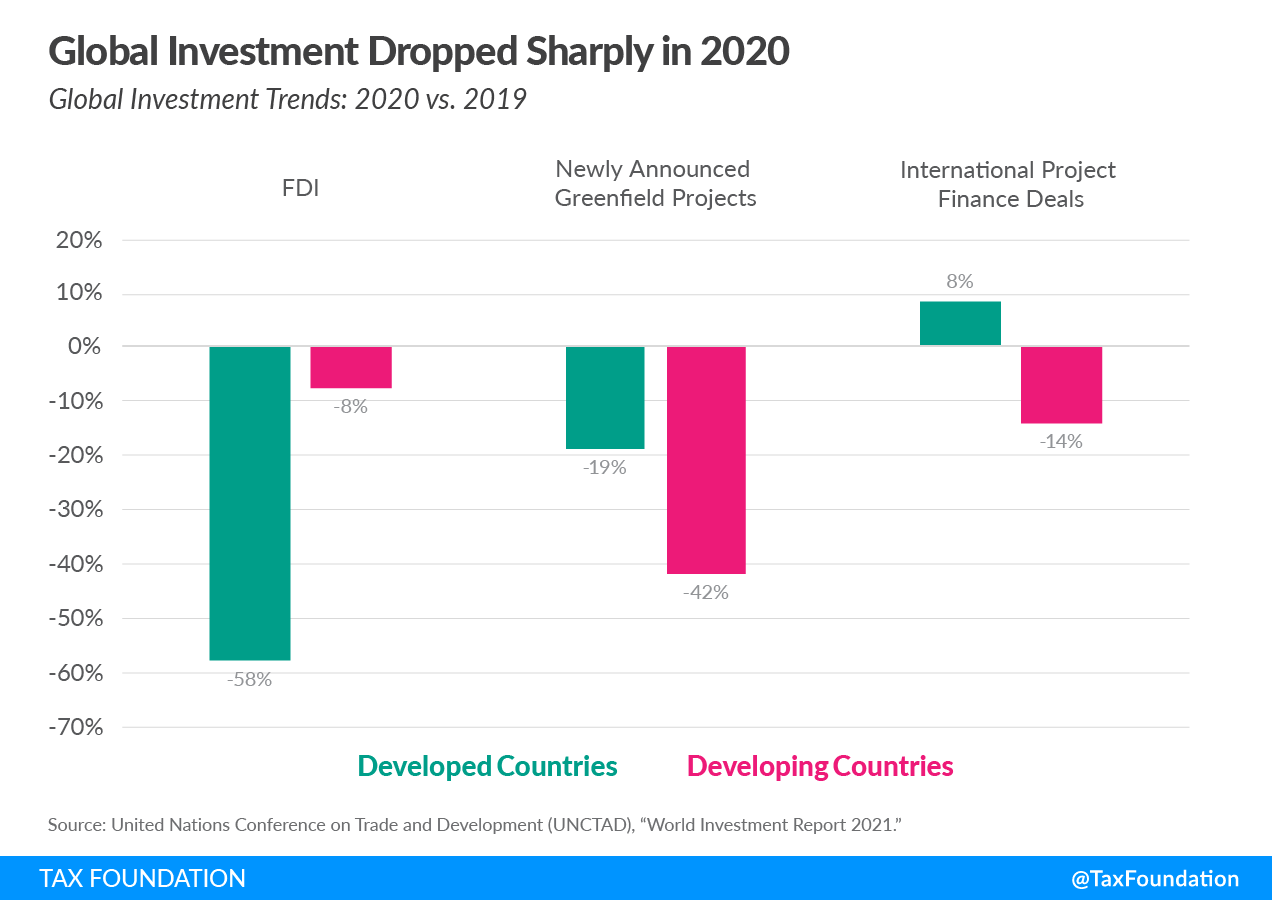The United Nations (UN) recently released its annual “World Investment Report,” which shows the dramatic fall in global foreign direct investment (FDI) caused by the COVID-19 crisis. A partial recovery is expected for 2021, with the most optimistic scenario showing a return to 2019 FDI levels by 2022. However, uncertainty remains high, with the ongoing international taxA tax is a mandatory payment or charge collected by local, state, and national governments from individuals or businesses to cover the costs of general government services, goods, and activities. negotiations at the OECD being a contributing factor. Clarity on the details of the new rules, as well as a policy design that minimizes the impact on global FDI, would provide international investors with some certainty in today’s highly uncertain global economy.
As a result of the COVID-19 crisis, FDI fell by a third to $1 trillion in 2020, compared to $1.5 trillion in 2019. As with so many aspects of this crisis, the fall in global investment was distributed unevenly across regions and types of investments. While FDI fell by a staggering 58 percent in developed countries, it fell by a more moderate 8 percent in developing countries. However, in developing countries the number of newly announced greenfield projects and international project finance deals dropped by 42 percent and 14 percent, respectively, compared to a less drastic change in developed economies.
The most significant decline in global FDI happened during the first half of 2020, with cross-border mergers and acquisitions (M&As) and international project finance deals largely recovering in the second half of 2020. However, greenfield projects, which tend to be more important for developing countries, continued to be down throughout 2020 and the first quarter of 2021.
Looking forward, global FDI is projected to increase between 10 to 15 percent in 2021, with the upper bound of projections showing a return to 2019 FDI levels in 2022. Importantly, though, these projections come with a high level of uncertainty, and largely depend on potential pandemic relapses, the ultimate impact of recovery spending packages on FDI, and policy pressures.
The UN report states, “The global tax landscape is in transition, with significant implications not only for tax revenues in home and host countries of international investment, but also for global investment patterns, investment promotion strategies and SDG financing.”
The currently ongoing tax negotiations at the OECD consist of two parts: First, a partial shift from taxing large multinationals in the location of their headquarters and operations to where they have their sales (“Pillar 1”); second, a global minimum tax (“Pillar 2”).
Both changes, but particularly the global minimum tax, would impact global FDI flows, as it would—by design—increase the tax costs of many cross-border investments. In addition, the compliance burden on multinationals, as well as the administrative burden on tax administrations, is expected to be relatively high due to the complexity of these proposals, causing additional uncertainty.
Of the 139 countries engaged in the negotiations at the OECD, 131 have now agreed on an outline for the new international tax ruleInternational tax rules apply to income companies earn from their overseas operations and sales. Tax treaties between countries determine which country collects tax revenue, and anti-avoidance rules are put in place to limit gaps companies use to minimize their global tax burden. s. The outline suggests that Pillar 1 and Pillar 2 should be put in place by 2023. Many of the details still need to be finalized, and countries will have to write new laws, adopt new tax treaty language, and repeal some policies that conflict with the new rules.
As highlighted in the UN report, international corporate tax reform could further increase uncertainty for international investors, and the policies “[…] may exert a far-reaching impact on global investment patterns […].” In light of the current state of global FDI, it will thus be even more important that policymakers around the world carefully design these new international tax rules—and provide as much certainty along the way as possible.
Stay informed on the tax policies impacting you.
Subscribe to get insights from our trusted experts delivered straight to your inbox.
Subscribe